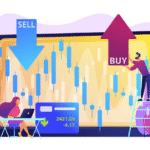5 Common Forex Trading Mistakes to Avoid
Forex trading offers opportunities for financial growth, but success requires skill, patience, and discipline. Many traders, especially beginners, fall into common traps that can hinder their progress. By understanding these trading mistakes and knowing how to avoid them, traders can improve their chances of achieving long-term success.

1. Over-Leveraging
Leverage allows traders to control larger positions with a small amount of capital, but it can also be dangerous if not managed properly. While the idea of multiplying profits sounds appealing, it’s important to understand that leverage also multiplies losses. Many traders, especially beginners, fall into the trap of over-leveraging, thinking it will fast-track their earnings.
Unfortunately, using excessive leverage can backfire when the market moves even slightly against a position. A small unfavorable price swing can wipe out a significant portion—or even the entirety—of a trading account. This is why it’s crucial to use conservative leverage ratios and set appropriate stop-loss orders to limit potential losses.
To manage leverage wisely, traders should assess their risk tolerance and adjust position sizes accordingly. It’s better to grow capital slowly and sustainably rather than chase big wins that come with huge risks. Proper education on margin requirements and leverage mechanics is also essential before engaging in high-leverage trading.
2. Ignoring Market Trends
One of the most common mistakes in trading is going against the prevailing market trend. Traders who ignore the direction of the market often end up placing trades based on guesswork or emotions rather than data. This approach increases the likelihood of loss and decreases consistency in trading outcomes.
Recognizing and aligning with market trends is essential for improving the probability of success. Traders can use tools like moving averages, trendlines, and momentum indicators to identify the market’s direction. Incorporating this information into a trading plan enables better timing for entries and exits.
Additionally, staying updated on macroeconomic events and sentiment shifts is important. Market trends are often driven by broader economic factors such as central bank announcements, employment reports, and geopolitical news. Monitoring these elements can give traders a more informed perspective and help them avoid trades that oppose strong trends.
3. Lack of a Trading Plan
Without a structured plan and solely relying on instincts or emotions to guide decisions often leads to inconsistent results, confusion, and frustration. A lack of planning can also result in overtrading, excessive risk-taking, and poor performance.
A solid trading plan includes specific details such as entry and exit strategies, risk-reward ratios, position sizing, and acceptable loss limits. This structure provides traders with a clear roadmap and helps reduce impulsive decision-making. When a plan is followed consistently, it becomes easier to evaluate performance and make improvements over time.
Developing a trading plan also enhances discipline and accountability. It allows traders to filter out noise and focus only on opportunities that meet their criteria. By committing to a plan and reviewing results regularly, traders can refine their strategies and steadily improve their trading performance.
4. Emotional Trading
Fear and greed often influence trading behavior. Traders may chase losses out of fear or hold onto winning positions too long due to greed. These emotional responses can derail a sound strategy and reduce long-term profitability.
Moreover, emotional trading often leads to panic selling or overtrading. To combat this, traders must develop emotional discipline. Using tools like stop-loss and take-profit orders helps maintain control, especially during market volatility. By staying calm and sticking to a plan, traders can navigate emotional pressure and protect their capital more effectively.
5. Neglecting Risk Management
Neglecting risk management is a serious mistake that can wipe out gains from successful trades. Some traders choose position sizes arbitrarily, ignoring how much capital they risk. As a solution, each trade should involve only a small, calculated percentage of the total trading account.
Additionally, risk-reward ratios must be considered before entering any trade. A well-managed portfolio spreads risk across multiple trades rather than depending on a single outcome. This not only preserves capital but also ensures that a losing streak doesn’t end a trading career.
Conclusion
Trading in the financial markets offers opportunities for substantial rewards, but it also presents considerable risks. Many traders, especially beginners, fall into common pitfalls that could easily be avoided with the right knowledge and preparation. Over-leveraging, ignoring market trends, trading without a plan, letting emotions dictate decisions, and neglecting risk management are all behaviors that can significantly hinder trading success. Recognizing these mistakes is the first step in improving performance and longevity in the markets.
Moreover, adopting a disciplined approach is essential to navigate the complex nature of trading. A well-defined strategy built on market analysis and risk management serves as a trader’s compass. Consistency, not luck, is what separates successful traders from the rest. By setting realistic goals, tracking progress, and learning from both wins and losses, traders can steadily improve their strategies. It’s also vital to remain adaptable, as market conditions can shift rapidly. Staying informed, updating one’s trading plan as needed, and maintaining emotional control all contribute to a more professional and methodical trading experience.
Ultimately, trading is not just about making money—it’s about developing the mindset and habits that lead to long-term growth. Successful traders treat the market as a business, not a game of chance. They invest in their education, stay committed to continuous improvement, and never stop learning from their mistakes. By acknowledging the most common errors and implementing structured, well-thought-out practices, traders increase their chances of achieving consistent results. Over time, these good habits will form the foundation of a sustainable and rewarding trading journey.
Top 5 Trading Tools Every Forex Trader Should Use Daily
Top 5 Trading Tools Every Forex Trader Should Use Daily Successful forex trading requires more than just a strategy. Traders must use the right trading
How TikTok Is Shaping the Way Gen Z Learns About Forex
How TikTok Is Shaping the Way Gen Z Learns About Forex TikTok is no longer just a platform for entertainment—it has become a hub for
Gold vs Forex: Which Is More Lucrative in Uncertain Times?
Gold vs Forex: Comparing Profit Potential, Risk, and Accessibility The debate around Gold vs Forex ultimately comes down to an investor’s risk tolerance, goals, and
How to Read Forex Charts Like a Pro
How to Read Forex Charts Like a Pro Forex charts are the backbone of every trader’s decision-making. Firstly, they visually show currency price movements over

CFD Trading Explained: What It Is and How It Works
CFD Trading Explained: What It Is and How It Works Contracts for Difference, more commonly known as CFD Trading, represent a modern way of engaging
SmarTrade Featured in Manila Standard for Bringing Back Exclusive Trading Seminar to Manila
SmarTrade Featured in Manila Standard for Bringing Back Exclusive Trading Seminar to Manila SmarTrade has once again proven its leadership in financial education as it
